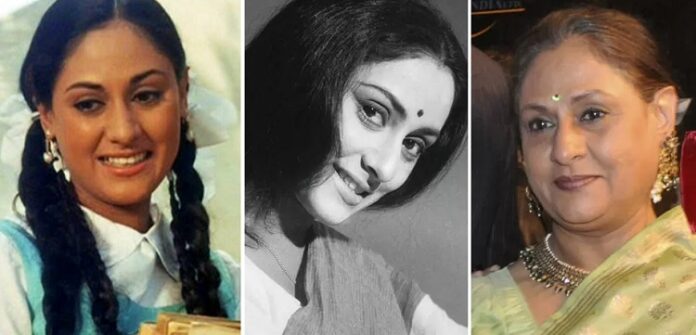| Subscribe to our YouTubeChannel |
|
|---|
Jaya Bachchan is the filmy mother who is always prepared with a puja ki thali when her son is in the vicinity for anyone born in the last three decades. Although that is a classic Hindi movie moment, Jaya Bachchan wasn’t always the movie’s leading lady.
On the occasion of Jaya’s 73rd birthday, we look back at Hrishikesh Mukherjee’s Guddi (1971), in which she co-starred with Dharmendra, Utpal Dutt, and Samit Bhanja.
Guddi tells the story of a 17-18-year-old girl named Kusum (Jaya Bachchan), also known as Guddi, who is completely smitten by film actor Dharmendra (played by Dharmendra). She thinks of herself as Meera to his Krishna in her naive mind. When a man (Samit Bhanja) proposes to Guddi, she declines because she has chosen Dharmendra as her beloved. Her uncle (Utpal Dutt) devises a scheme for her to meet Dharmendra in person and discover that what one sees on screen isn’t real life.
When we first encounter a young Jaya Bhaduri, her childlike innocence is evident in the way she tells her teacher the truth. The dream sequence in which she imagines a movie star serenading her is adorable and a little amusing, but it portrays her as an impressionable young woman who is enthralled by what she sees on television.
When Guddi gets a chance to hang out with Dharmendra on a movie set, she is taken aback, but as she grows older and realises that much of what she sees on screen is made up, she begins to value real-life heroic deeds over those that involve duplicates.
Guddi is a tale about the difference between fantasy and reality. The film encourages the viewer, as well as Guddi, to consider what we consider to be glamour versus what happens behind the scenes. The subplots involving Asrani, who has left his family behind to become a movie star, the severely ill lightman who can’t afford to give up his daily wages, the journalist who has to hype up the salacious content of his magazine to increase sales, and Pran’s cameo, which completely contradicts his on-screen villainous image, all add to the narrative that the glamorous world of movies has a dark side. The scene in which Dharmendra shows her the abandoned set where they once filmed Bandini makes you reflect on how fleeting movies are.
Hrishikesh Mukherjee co-wrote and directed Guddi, and like his other films, Guddi relies on simplicity to effectively communicate the message – not everything that glitters is gold. The music of the film, composed by Vasant Desai and written by Gulzar, is timeless, and with songs like “Bole Re Papihara,” it appears that it will be with us for decades.
Guddi’s story is a ruse because she is told a lie by her uncle, and despite the fact that his acts are for the greater good, the titular character is never told the truth about her so-called chance encounter with a movie star. In the scene where Guddi is teased by some phoney goons, this particular feature feels troublesome. Navin runs to her aid and ends up severely beating them, persuading Guddi that Navin is a true hero.
Guddi appears to be a young girl today, but in the 1970s, a woman in her late teens might be married to a man in his early 20s.
The film’s central plot – contrasting between glamour and fact, as well as its take on the film industry’s farce – is just as relevant today as it was 50 years ago in terms of its importance.


















